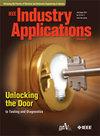CVaR-Wasserstein Metric Based Power System Scheduling Considering Frequency Support of Hydrogen Production Stations
IF 4.2
2区 工程技术
Q2 ENGINEERING, ELECTRICAL & ELECTRONIC
引用次数: 0
Abstract
The increasing penetration of renewable energy sources (RES) results in a significant reduction in system inertia and primary frequency response (PFR) reserve and an increase in frequency instability risks caused by power imbalances. The Hydrogen production station (HPS) equipped with virtual synchronous machine control is capable of providing virtual inertia and PFR support. However, it is difficult to efficiently formulate and determine the power system dispatching schedule considering the frequency support from HPS while satisfying power and hydrogen balance. A CVaR-Wasserstein metric based distributionally robust scheduling model is proposed. The frequency security constraints are formulated considering the virtual inertia and PFR support provided by HPS. The CVaR-Wasserstein metric ambiguity set is constructed to address the RES uncertainty. Case studies using the modified IEEE-118 and IEEE-300 test systems demonstrate the effectiveness of the proposed model. The results show that the frequency support provided by HPS can effectively reduce the requirement on inertia and PFR provided by synchronous generators and the operating cost of power systems.求助全文
约1分钟内获得全文
求助全文
来源期刊

IEEE Transactions on Industry Applications
工程技术-工程:电子与电气
CiteScore
9.90
自引率
9.10%
发文量
747
审稿时长
3.3 months
期刊介绍:
The scope of the IEEE Transactions on Industry Applications includes all scope items of the IEEE Industry Applications Society, that is, the advancement of the theory and practice of electrical and electronic engineering in the development, design, manufacture, and application of electrical systems, apparatus, devices, and controls to the processes and equipment of industry and commerce; the promotion of safe, reliable, and economic installations; industry leadership in energy conservation and environmental, health, and safety issues; the creation of voluntary engineering standards and recommended practices; and the professional development of its membership.
 求助内容:
求助内容: 应助结果提醒方式:
应助结果提醒方式:


